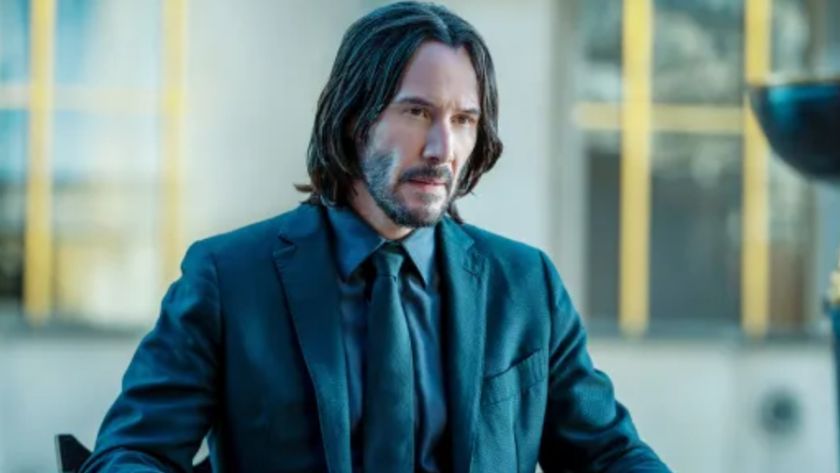18 Awesome Movie Poets
Master wordsmiths unite
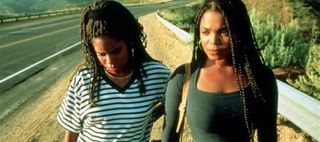
Poetic Justice (1993)
The Poet: Justice
Suffered For Her Art: Poor old Justice is all alone in the world: her mother’s long gone, and her lover's been shot dead. Since then, she’s been searching for some kind of meaning in her life.
Killer Rhyme: Lying, thinking / Last night / How to find my soul a home / Where water is not thirsty / And bread loaf is not stone
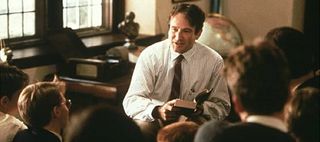
Dead Poets Society (1989)
The Poet: John Keating
Suffered For His Art: A poetry teacher rather than a lauded lyricist himself, Keating nevertheless possesses a poet’s heart.
As he attempts to teach kids at Welton Academy the wonder of words, sadly the dreams that he unlocks in their minds prove disastrous – to Keating’s career and his boys…
Killer Rhyme: O Captain! my Captain! rise up and hear the bells / Rise up - for you the flag is flung - for you the bugle trill
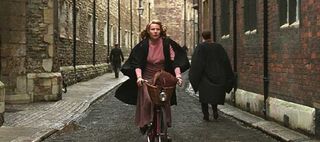
Sylvia (2003)
The Poet: Sylvia Plath
Suffered For Her Art: She may have written her first poem before tragedy tainted her life, but the sad days quickly rolled around as Sylvia’s father unexpectedly died.
Wallowing in depression, she attempted suicide, married Ted Hughes, but was never able to find happiness.
Killer Rhyme: I was ten when they buried you. / At twenty I tried to die / And get back, back, back to you. I thought even the bones would do.
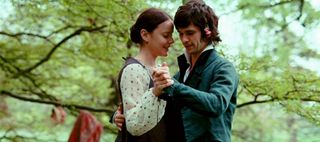
Bright Star (2009)
The Poet: John Keats
Suffered For His Art: Pulled away from the woman he loved, Keats’ aching heart and longing for young Fanny Browne inspired him to write some of history’s most beautiful love poems.
Killer Rhyme: Still, still to hear her tender-taken breath, / And so live ever - or else swoon to death.
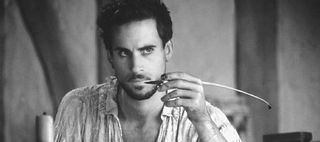
Shakespeare In Love (1998)
The Poet: William Shakespeare
Suffered For His Art: Difficult to say, what with numerous theories about Shakespeare’s existence all hypothesizing that he could really have been any number of different people.
From Romeo & Juliet, though, we’d say he was a hopeless romantic at the very least.
Killer Rhyme: Shall I compare thee to a summer's day? / Thou art more lovely and more temperate: / Rough winds do shake the darling buds of May, / And summer's lease hath all too short a date

Howl (2011)
The Poet: Allen Ginsberg
Suffered For His Art: Living in a time when homosexuality was a criminal offence, Ginsberg had to find a way to fight back against his oppressors – and found the perfect way in his poetry. Which of course, was then dragged through the courts…
Killer Rhyme: …who broke down crying in white gymnasiums naked / and trembling before the machinery of other / skeletons, who bit detectives in the neck and shrieked with delight / in policecars for committing no crime but their / own wild cooking pederasty and intoxication, / who howled on their knees in the subway and were / dragged off the roof waving genitals and manu-scripts…

Im Not There (2007)
The Poet: Arthur Rimbaud
Suffered For His Art: Named after the 19th century French Poet, Arthur’s stuck in an interrogation room where he’s forced to provide the answers to mysterious and unheard questions.
Killer Rhyme: I accept chaos. I don't know whether it accepts me.

Mrs Parker And The Vicious Circle (1994)
The Poet: Dorothy Parker
Suffered For Her Art: Dot, or Dottie, was only five years old when her mother died. When her father remarried, she distanced herself from both him and her stepmother, and accused her father of physical abuse. He died when she was 10.
Killer Rhyme: And you believe, so well I know my part, / That I am gay as morning, light as snow, / And all the straining things within my heart / You'll never know.

Total Eclipse (1995)
The Poet: Arthur Rimbaud
Suffered For His Art: The real Rimbaud was born in Charleville in 1891, and only wrote until he was 21. Despite that, he became an influential figure in the arts. His troubled relationship with Paul Verlaine is well-documented, and Rimbaud died of cancer at just 37 years old.
Killer Rhyme: All the forms of love, suffering, and madness. / He searches himself. / He exhausts all poisons in himself and keeps only their quintessences.
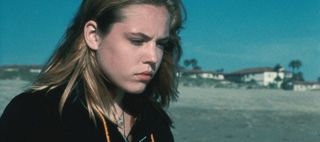
Blue Car (2002)
The Poet: Megan Denning
Suffered For Her Art: Megan’s a 16-year-old whose father abandoned her, her mother and her sister. Her mother, meanwhile, is too busy attempting to earn money to give Megan the time of day.
Meanwhile, her young sister has mental problems that could prove fatal. Then her English teacher shows a keen interest in her…
Killer Rhyme: Fiction, fiction, lies, lies / I am the coming poet who will arise
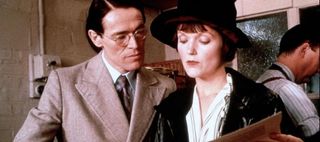
Tom & Viv (1994)
The Poet: T. S. Eliot
Suffered For His Art: Eliot despised university towns, leaving Merton after just a year. His time at the Smith Academy aged 14 resulted in him becoming a gloomy young poet. His first marriage fell by the wayside, and he finally died of emphysema in 1965.
Killer Rhyme: Let us go, through certain half-deserted streets, / The muttering retreats / Of restless nights in one-night cheap hotels / And sawdust restaurants with oyster-shells

The Edge Of Love (2008)
The Poet: Dylan Thomas
Suffered For His Art: A sickly Welsh child who insisted his name be pronounced ‘Dillan’ and not ‘Dullan’, Thomas preferred time on his own reading as a youngling and was later deemed too frail to serve in World War II.
He suffered from bronchitis and asthma, and his father’s death prompted him to write his most powerful piece…
Killer Rhyme: Do not go gentle into that good night, / Old age should burn and rage at close of day; / Rage, rage against the dying of the light.
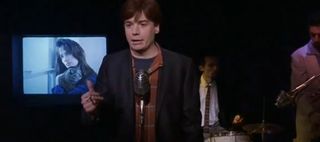
So I Married An Axe Murderer (1993)
The Poet: Charles McKenzie
Suffered For His Art: Paranoid and commitment-phobic, Charles is unable to keep a relationship together. The he meets Harriet, a butcher who may or may not be a serial killer…
Killer Rhyme: Woman! Wo-man! Wooooman! She was a thief, you gotta believe, she stole my heart and my cat. Betty. Judie. Josie and those hot pussycats. They make me horny, Saturday morning, girls of cartons will leave me in ruins, I want to be Betty’s Barney.

The Basketball Diaries (1995)
The Poet: Jim Carroll
Suffered For His Art: As a teenager living in New York, Carroll was subsumed into the city’s hard drug culture. At just 13, he was a heroin addict, and his Basketball Diaries chart his early teen years as he battles with that addiction. He died of a heart attack in 2009.
Killer Rhyme: Dreams, tossing in the turbulence / of your variegated pupils / your voice crawling / through the igneous pain of simplicity / today you are apart, seperated
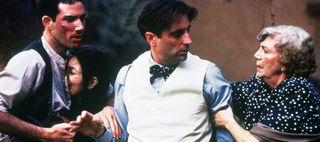
The Disappearance Of Garcia Lorca (1997)
The Poet: Federico García Lorca
Suffered For His Art: After a happy childhood, Lorca’s first staged play The Butterfly’s Evil Spell was laughed off the stage, an event that deeply affected the writer’s relationship with theatre.
Later, his amorous advances on Salvador Dalí were rejected, and Lorca struggled with the burden of his homosexuality in a world that hadn’t accepted it.
Killer Rhyme: Now in Vienna there’s ten pretty women / There’s a shoulder where Death comes to cry / There’s a lobby with nine hundred windows / There’s a tree where the doves go to die
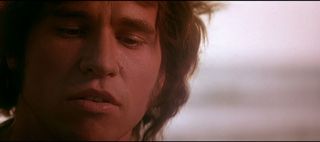
The Doors (1991)
The Poet: Jim Morrison
Suffered For His Art: When he was just four years old, Morrison witnessed a traumatic car accident in which a family of American Indians were seriously injured – possibly killed.
Morrison referred to this as the defining moment of his life, the horrific incident reappearing in many of his works.
Killer Rhyme: We come to this world desperately, / we die in a fear of being dead. / Who could make up such a cruelty?

Il Postino (1994)
The Poet: Pablo Neruda
Suffered For His Art: In 1948, Neruda was hidden in the basements of friends when Conservative Chilean President González Videla outlawed communism, and escaped into Argentina where he remained exiled for years.
Killer Rhyme: I remembered you with my soul clenched / in that sadness of mine that you know. / Where were you then? / Who else was there? / Saying what?

The Libertine (2004)
The Poet: John Wilmot, 2nd Earl of Rochester
Suffered For His Art: Friend to King Charles II, Wilmot “grew debauched” while studying at Oxford (though does that really count as suffering?). He fought the Dutch in a sea battle that earned him hero status, but fell out of the king's favour after writing a satire on Charles.
Then, after a fight with a night watchman, he went underground as a quack physician. His love of the drink meant that by the time he was 33, Wilmot was dying.
Killer Rhyme: God bless our good and gracious king, / Whose promise none relies on; / Who never said a foolish thing, / Nor ever did a wise one.
Josh Winning has worn a lot of hats over the years. Contributing Editor at Total Film, writer for SFX, and senior film writer at the Radio Times. Josh has also penned a novel about mysteries and monsters, is the co-host of a movie podcast, and has a library of pretty phenomenal stories from visiting some of the biggest TV and film sets in the world. He would also like you to know that he "lives for cat videos..." Don't we all, Josh. Don't we all.


